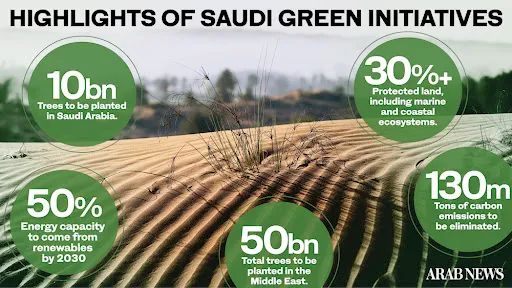Saudi Vision 2030 and Agriculture: A Comprehensive Overview
Saudi Vision 2030 is a comprehensive plan for Saudi Arabia's economic and social transformation, with agriculture playing a crucial role in its success. The Vision aims to diversify the economy, enhance food security, and promote sustainable development within the agricultural sector.
Key Goals and Targets
The Saudi Vision 2030 sets ambitious targets for the agriculture sector, including:
Achieving Self-Sufficiency in Key Food Products: The Vision aims to achieve high levels of self-sufficiency in essential commodities like dairy, eggs, poultry, and seafood by 2030, ensuring that local production meets domestic demand. This goal has already been surpassed for dairy and eggs.
Increasing the Agriculture Sector’s Contribution to the Economy: The goal is to double agricultural output by 2030 compared to the early years of the Vision, increasing the sector's contribution to the Kingdom’s GDP.
Enhancing Food Security and Reducing Waste: The Vision aims to ensure the availability and price stability of food supplies while reducing food loss and waste by around 50% by 2030.
Global Leadership in Select Agricultural Products: The Kingdom seeks to enhance its global competitiveness in the export of Saudi food products, particularly in the date sector.
Sustainable Agricultural Development and Resource Protection: Vision 2030 emphasizes the sustainable use of natural resources, including improving water efficiency and expanding the use of modern agricultural technologies like smart and vertical farming.
Achievements and Progress in 2024
In 2024, the Saudi food and agriculture sector achieved significant milestones:
Record GDP Contribution: The sector's contribution to GDP reached a historic record of SAR 114 billion, reflecting the growing economic significance of agriculture.
High Levels of Food Self-Sufficiency: Saudi Arabia has achieved unprecedented levels of food self-sufficiency, with local dairy production covering 109% of domestic demand and egg production meeting 116%. Poultry and seafood self-sufficiency also saw significant improvements.
Food Safety Standards: Saudi Arabia ranked among the top five countries globally for the absence of harmful trans fats in its food products, reflecting the success of regulatory bodies in raising food safety standards.
Environmental Sustainability: More than 115 million trees were planted by the end of 2024 as part of the Saudi Green Initiative, contributing to the rehabilitation of degraded land and enriching biodiversity.
Investment Opportunities and Entrepreneurial Prospects
The Saudi food and agriculture sector is attracting significant investment, creating opportunities for entrepreneurs and investors:
Jeddah Food Cluster: The establishment of the Jeddah Food Cluster in 2024, the largest food industrial cluster in the region, aims to advance food manufacturing and attract substantial private sector investments.
Attracting Global AgTech Companies: Leading international companies are opening regional offices in Saudi Arabia, providing advanced technology solutions in smart farming and water conservation.
Government Support: Investors benefit from supportive government financing programs and national strategies that provide incentives for expanding organic and livestock food production projects.
Technological Innovations and Sustainable Practices
Technology and sustainability are central to the transformation of Saudi agriculture:
Smart Farming: The integration of AI and IoT is revolutionizing traditional farming methods, enabling data-driven decision-making for optimizing irrigation, fertilization, and pest control.
Vertical Farming: Vertical farming is gaining momentum, supporting year-round, high-quality food production in compact urban environments.
Water Conservation: Initiatives like the world’s first solar-powered desalination plant provide eco-friendly water sources for irrigation.
Circular Farming: Circular farming models, such as Tanmiah Food Company's approach, are being implemented to recycle wastewater for agricultural purposes, conserve groundwater, and reduce reliance on costly desalination processes.
Sustainable Feed: The use of Moringa trees as a sustainable, local alternative to imported feed is reducing dependence on imports and linking food production with land restoration.
Plant-Based Diets: The growing popularity of plant-based diets is reshaping the agricultural landscape, creating opportunities for alternative crops and technologies.
Government Initiatives and Strategies
The Saudi government is implementing various initiatives to support agricultural growth and sustainability:
National Agriculture Strategy: This strategy provides a framework for developing agricultural activities, contributing to food and water security, and economic development.
National Agricultural Transformation Program 2020-2025: This program aims to increase agricultural production and reduce food imports.
National Food Security Strategy 2021-2030: This strategy ensures the availability of safe, affordable, and nutritious food.
Saudi Food and Drug Authority (SFDA): The SFDA regulates food safety and quality.
Saudi Agricultural and Livestock Investment Fund (SALIC): SALIC provides financial support to agricultural and livestock projects.
Saudi Export Development Authority: This agency promotes Saudi food exports.
Saudi Green Initiative: This initiative aims to plant 10 billion trees and combat desertification.
The Role of Smart Agriculture
Smart agriculture is crucial for achieving the goals of Vision 2030, particularly in enhancing food security, diversifying the economy, and promoting sustainability. By leveraging technology, Saudi Arabia aims to increase local food production, reduce import dependence, and create a more resilient food system.
Challenges and Future Prospects
While there are challenges, such as the initial costs of implementing new technologies and the need for training, the commitment from the government and private sectors indicates a strong will to overcome these hurdles. The future of Saudi agriculture looks promising, with smart agriculture playing a key role in achieving food security, economic diversification, and sustainable growth.
In conclusion, Saudi Vision 2030 is driving a comprehensive transformation of the agricultural sector, focusing on self-sufficiency, economic contribution, food security, and sustainable practices. The integration of technology, investment in innovation, and supportive government policies are paving the way for a more resilient and prosperous agricultural future.

